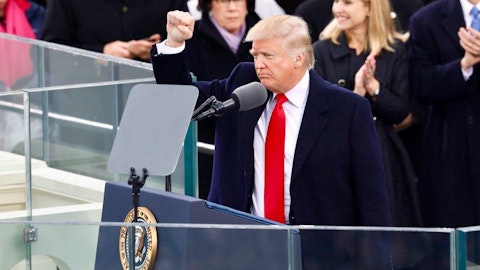Mary Schlangenstein: Hi, good morning. I wanted to ask real quickly, with the ongoing slot waiver situation in New York where the airlines were asked to reduce capacity because of the congestion in the air traffic controller shortage, can you talk about how much of that Delta is taking advantage of? And whether you expect that if it continues long term to start to have some significant impact? Also whether you’re redeploying that capacity into other markets?
Ed Bastian: Well, thanks for that question. Yes, we’re planning on using the entirety of the slot waiver which is, I believe, 10% of our flights into and out of Kennedy and LaGuardia in order to help with the airspace congestion issues that are surrounding those airports right now. So, what we’re trying to do is have minimal impact. We will not withdraw from any individual markets. We will thin out some frequencies. We’ll put some larger gauge in. And any of the assets that are freed up from New York will get redeployed into other parts of our network for now. But it shouldn’t really be very different than the summer. As you know, that’s rolled forward from the summer, which we had 10% out, and that’s just extending it through the winter. So, you won’t see really, I think, any dramatic changes to our schedule versus where we’re sitting today.
Mary Schlangenstein: Does that become a broader problem for you if that continues to be extended?
Ed Bastian: I think the broader problem is not being able to operate in the New York airspace. And so I think we’re working very closely with the government to see what we can do to improve the situation there. It was very difficult on our customers this summer, and certainly, we’re all hoping for some relief by next summer.
Peter Carter: And Mary, we really — this is Peter Carter. We really appreciate the FAA providing that relief and acknowledging that there is a constraint in the northeast with respect to the staffing of air traffic controllers. And frankly, that’s the thing that we need to really solve as an industry.
Mary Schlangenstein: Okay. Thank you.
Operator: Thank you. Your next question is coming from Leslie Josephs from CNBC. Your line is live.
Leslie Josephs: Hi, good morning. We keep seeing air fares fall, and I was wondering if you could talk a little bit about what kind of discounting you’re having to do in the fall. And then have you made any capacity changes on days when people might have traveled in the off-peak and maybe they’re going back to more traditional bookings, if that’s the case? Thanks.
Glen Hauenstein: Sure. I think the most recent data that came out this morning had been flat to up slightly month-over-month, so I don’t think that as an industry level, that’s a good indication. What we’ve seen is that actually June was our lowest point in terms of year-over-year average fares and it’s moved up for us since then. And that’s really driven by the premium side and the success we’ve had in terms of selling more premium and the fares we’re getting for our premium products and services. So yes, at the bottom end, there’s some discounting. There’s also some fare initiatives. So, it’s always a very fluid situation. And right now, I think we’re very — we’re calling it stable between third quarter and fourth quarter.
Leslie Josephs: And the fares that you’re discounting to, is that like on par with 2019 or is that — like is there a kind of a reference point for…
Glen Hauenstein: Yeah, certain markets are, certain markets are above. So I think the market basket is there — at the very bottom end, they may be slightly below where they were in ’19, but not really. There’s always a fare in a market that is below, but in general, they’re not.
Leslie Josephs: Thank.
Tim Mapes: Thank you, Leslie. Matthew, we have time for one final question, please.
Operator: Certainly. Your last question is coming from David Slotnick from TPG. Your line is live.
David Slotnick: Good morning, and thank you for taking the question. Coming back to the loyalty program, were you surprised by the customer reaction and I suppose the degree of it? And what were you sort of expecting instead of that effect?
Ed Bastian: We were certainly expecting some feedback. And by the way, some of the feedback we’ve received is very positive and encourages us not to make any changes. So, there wasn’t any one cohort that was silent on the matter. We heard all of the — a full 360 view of the perspective. But it gave us a chance to sit back, reflect on it. And there were points about the program that I thought that we could make some modifications to. There still will be changes to the program. I’ve been very clear about that, but we’re going to make modifications to what we announced.
David Slotnick: Thank you. And just a follow-up. Was American Express expecting any changes to the premium card demand just with the lounge access? Do they think that, that’s potentially going to fall? And if so, will that impact your loyalty revenue?
Glen Hauenstein: American Express, we, of course, did this with full back-and-forth knowledge, so we did this together with American Express. And if anything, since we’ve announced it, we’ve seen a shift to higher premium card acquisitions. So, I think we’re well within from that perspective where we thought we’d be.
David Slotnick: Great. Thank you.
Tim Mapes: Thank you, David. And Matthew, I think that will conclude our call.
Operator: Thank you. That concludes today’s conference. Thank you for your participation today.
Follow Delta Air Lines Inc. (NYSE:DAL)
Follow Delta Air Lines Inc. (NYSE:DAL)
Receive real-time insider trading and news alerts





